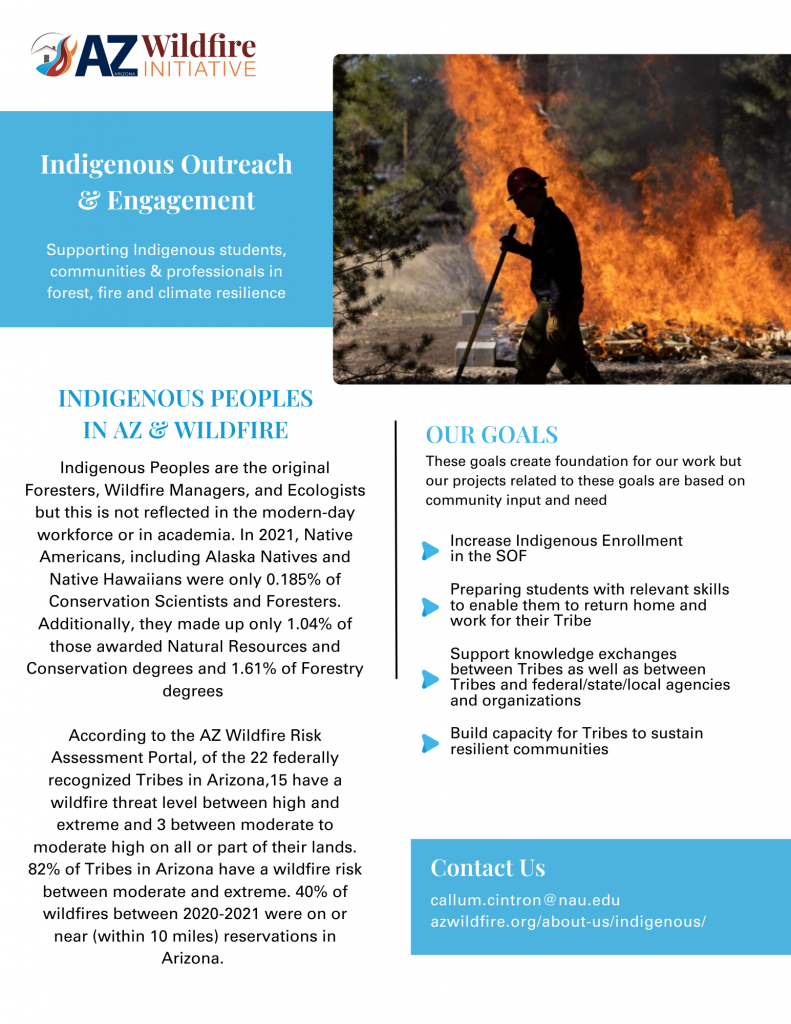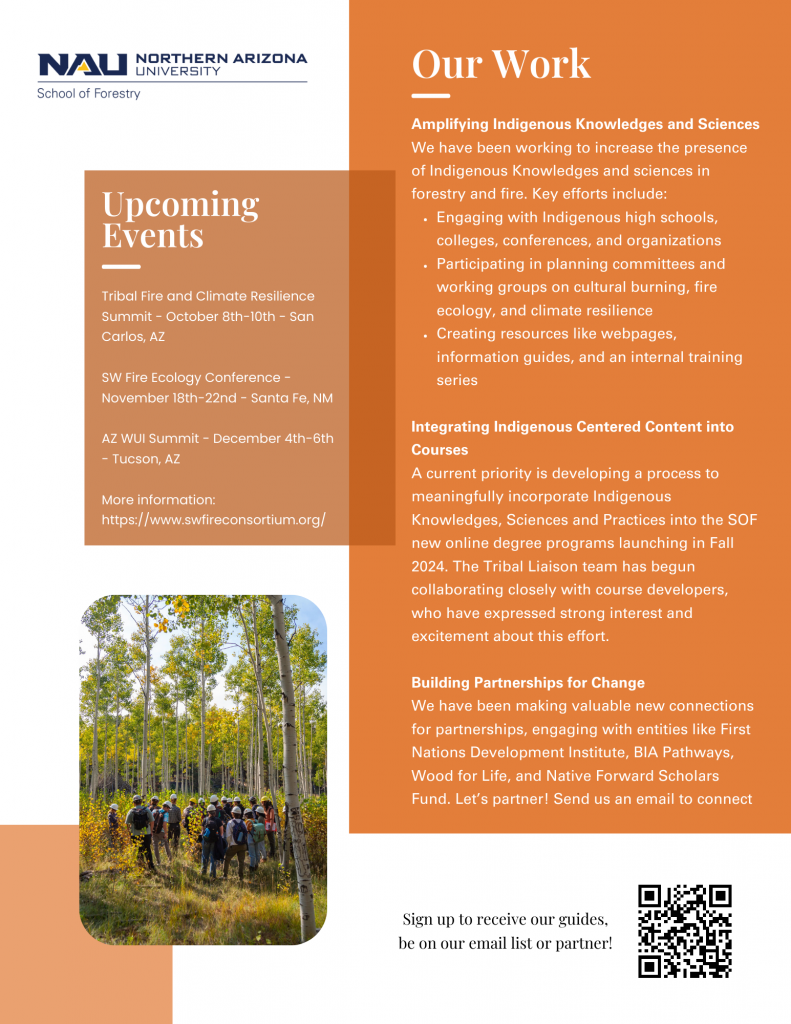
Engaging Indigenous Students, Professionals and Communities
AZWI supports Indigenous students, organizations, professionals and Nations in Arizona as well as partners with federal agencies that serve Tribes such as the BIA – Western Region. Our Tribal Liaison, Callum Cintron (They/Them), engages in communications and relationship-building with Indigenous communities to aid in forest, fire and community resilience. Their work involves collaboration on programs and projects in addition to internal development to serve Tribal needs and incorporate Indigenous Knowledges and sciences into AZWI’s facets: Workforce Development and Education, Science Communication and Community Resilience
Resource and Information Guides
Indigenous Communities and Wildfire
Indigenous Peoples of the so-called United States have tended to and cultivated these lands since time immemorial. They are the original Foresters, Wildfire Managers, and Ecologists but this is not reflected in the modern-day workforce or in academia. In 2021, Native Americans, including Alaska Natives and Native Hawaiians were only 0.185% of Conservation Scientists and Foresters. Additionally, they made up only 1.04% of those awarded Natural Resources and Conservation degrees and 1.61% of Forestry degrees
According to the AZ Wildfire Risk Assessment Portal, of the 22 federally recognized Tribes in Arizona,15 have a wildfire threat level between high and extreme and 3 between moderate to moderate high on all or part of their lands. 82% of Tribes in Arizona have a wildfire risk between moderate and extreme. 40% of wildfires between 2020-2021 were on or near (within 10 miles) reservations in Arizona.
Wildfire Threat Level by Tribe:
- High and Extreme
- Cocopah Indian Tribe, Colorado River Indian Tribes, Fort Mojave Indian Tribe, Fort Yuma-Quechan Tribe, Gila River Indian Community, Hopi Tribe, Hualapai Tribe, Kaibab Band of Paiute Indians, Pascua Yaqui Tribe, San Carlos Apache Tribe, Tohono O’odham Nation, Tonto Apache Tribe, White Mountain Apache Tribe, Yavapai-Apache Tribe , Yavapai-Prescott Indian Tribe
- Moderate to Moderate High
- Fort McDowell Yavapai Nation, Havasupai Tribe, Navajo Nation
Online Education Opportunities in the School of Forestry
On-site education adds an additional barrier to accessing higher education, especially for some communities. The School of Forestry is proud to offer an online Professional Certificate and a Natural Resources Management Graduate Certificate. In Fall 2024 we will begin our new fully online bachelor’s and master’s programs
Fire and Forest Management Professional Certificate
- Meet continuing education requirements to help advance your career while learning useful information that adapts to the needs of the future. You will grow your understanding of the importance of forest and fire ecology, fire science concepts, natural resources and fire management in 15 credits. The courses taken in the Professional Certificate can be transferred in to our on-site and online Bachelor of Science programs!
Natural Resource Management Graduate Certificate
- Gain a breadth of knowledge in managing forests and natural resources. This 12 credit Graduate Certificate is grounded in both natural and social sciences. A great opportunity for mid-career working professionals lacking natural resource-specific education credentials or those exploring their graduate school interests. The Natural Resource Management Graduate Certificate courses may be applied to the online master’s program!
Bachelor of Science in Applied Wildland Fire Sciences (Fall 2024)
- Learn about managing wildfires and working with organizations ranging from municipal to state, federal, and international. You will gain the specialized knowledge and degree required for supervisory or career positions. Students will complete this program with a solid foundation in wildland fire management, encompassing ecological knowledge, management skills, problem-solving abilities, and effective communication strategies.
Master of Forestry and Natural Resources Management (Fall 2024)
- This degree is designed to provide a breadth of knowledge in the stewardship of forests and natural resources related to land management, conservation, and ecological restoration. The skills gained by students in these graduate-level courses include practical knowledge and management techniques related to fire ecology, communities and fire, forest ecology, policy, GIS, international forestry, economics, Traditional Ecological Knowledge, and wildlife. Students will finish this program prepared for employment with governmental, non-governmental, and private organizations involved with natural resources and land management
Land Acknowledgement
Northern Arizona University sits at the base of the San Francisco Peaks, on homelands sacred to Native Americans throughout the region. We honor their past, present, and future generations, who have lived here for millennia and will forever call this place home.


